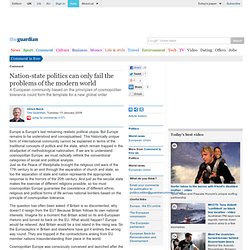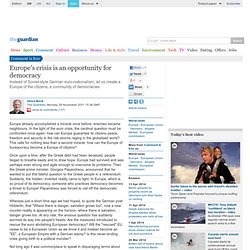

Www.c-s-p.org/Flyers/978-1-4438-2841-3-sample.pdf. Individualization: institutionalized individualism and its social and ... - Ulrich Beck, Elisabeth Beck-Gernsheim. Interview with Ulrich Beck: “Nationalism does not leave much room for the recognition of others” La intel·ligència tecnològica, que només té sentit si ens facilita la vida, és tan sols una part de la intel·ligència que ens cal.

Carme Torras és professora d’investigació del CSIC a l’Institut de Robòtica (CSIC-UPC), on lidera una línia de recerca en l’àmbit de la percepció i la manipulació. A banda de la seva carrera científica, Torras ha desenvolupat una obra literària singular. És autora de La mutació sentimental, una novel·la que aborda el món de la robòtica i que va obtenir el Premi de Narrativa de Ciència-Ficció Manuel de Pedrolo 2007. L’aportació més important a la ciència del doctor Jordi Sabater Pi té a veure amb el descobriment de les àrees culturals dels ximpanzés.
Els seus estudis i observacions sobre aquest tema, publicats a les revistes científiques més importants del món, han ajudat decisivament a canviar la visió antropocèntrica de l’univers. Primer els cuiners van aixecar la cuina d’avantguarda catalana al punt més alt del prestigi internacional. Ulrich Beck: Nation-state politics can only fail the problems of the modern world. Europe is Europe's last remaining realistic political utopia.

But Europe remains to be understood and conceptualised. This historically unique form of international community cannot be explained in terms of the traditional concepts of politics and the state, which remain trapped in the straitjacket of methodological nationalism. If we are to understand cosmopolitan Europe, we must radically rethink the conventional categories of social and political analysis.
Just as the Peace of Westphalia brought the religious civil wars of the 17th century to an end through the separation of church and state, so too the separation of state and nation represents the appropriate response to the horrors of the 20th century. And just as the secular state makes the exercise of different religions possible, so too must cosmopolitan Europe guarantee the coexistence of different ethnic, religious and political forms of life across national borders based on the principle of cosmopolitan tolerance.
Europe's crisis is an opportunity for democracy. Europe already accomplished a miracle once before: enemies became neighbours.

In the light of the euro crisis, the cardinal question must be confronted once again: how can Europe guarantee its citizens peace, freedom and security in the risk-storms raging in the globalised world? This calls for nothing less than a second miracle: how can the Europe of bureaucracy become a Europe of citizens? Once upon a time, after the Greek debt had been devalued, people began to breathe easily and to draw hope: Europe had survived and was perhaps even strong and agile enough to overcome its problems. Then the Greek prime minister, Giorgios Papandreou, announced that he wanted to put this fateful question to the Greek people in a referendum.
Suddenly, the hidden, inverted reality came to light. Not long ago it was commonplace to speak in disparaging terms about the cacophony in the European Union. All of that suddenly looks like folklore. Not just the power structure has undergone a permanent shift.